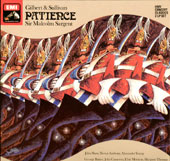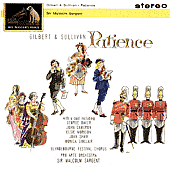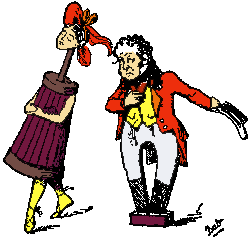Patience

or Bunthorne's Bride
Music by Arthur Sullivan: Lyrics and Libretto by W.S. Gilbert
Opéra Comique, London - 23 April, 1881 subsequently at the Savoy Theatre, 10 October, 1881
The Story
(Exterior of Castle Bunthorne / A Glade)
 The scene opens on Castle Bunthorne, residence of Reginald Bunthorne, who is described as 'a fleshly poet'. Outside the castle, young ladies dressed in aesthetic dress, playing lutes and other instruments, are apparently in the last stage of despair as they sing. Angela, Ella and Saphir are among them.
Adopting languorous attitudes, they proclaim themselves to be 'twenty love-sick maidens', pining for Bunthorne, who cares not for them. Enter the middle-aged Lady Jane, who also is lovesick for Bunthorne. She announces that Bunthorne is in love with Patience, a dairymaid. But, comments Saphir, Patience herself boasts that she has never loved. Patience enters and confirms, with some pride that she knows not what love is.
The scene opens on Castle Bunthorne, residence of Reginald Bunthorne, who is described as 'a fleshly poet'. Outside the castle, young ladies dressed in aesthetic dress, playing lutes and other instruments, are apparently in the last stage of despair as they sing. Angela, Ella and Saphir are among them.
Adopting languorous attitudes, they proclaim themselves to be 'twenty love-sick maidens', pining for Bunthorne, who cares not for them. Enter the middle-aged Lady Jane, who also is lovesick for Bunthorne. She announces that Bunthorne is in love with Patience, a dairymaid. But, comments Saphir, Patience herself boasts that she has never loved. Patience enters and confirms, with some pride that she knows not what love is.
She tells everyone that the 35th Dragoon Guards have arrived in the village. But the Maidens, although a year ago were all engaged to the officers, now care nothing for them.
The officers enter in full uniform and in swaggering style. The colonel details the sum of the exceptional qualities that go to make up a Heavy Dragoon.
Enter Lieutenant the Duke of Dunstable, who has entered the army to avoid the boring, undeserving flattery which his noble rank attracts elsewhere. With his fellow officers he sees Bunthorne approach, followed by the love-sick Maidens.
The Maidens only pay attention to Bunthorne and completely ignore the officers. The officers call this state of affairs preposterous; the Maidens continue their amorous plaint; and Bunthorne admits that (while pretending to ignore them) he really observes all that the Maidens do.
Bunthorne declares that he has finished writing a poem and reads it—'a wild, weird, fleshly thing; yet very tender, very yearning, very precious'—to the enraptured Maidens. He leaves. But still the Maidens scorn the officers: 'You are not even early English!'
The officers consider this an insult to their uniform,
'a uniform that has been as successful in the courts of Venus as on the field of Mars!'
How unexpected that the appearance of the 'long-haired aesthetics' should prove more attractive than the British military uniform! With which sentiments they leave angrily.
Entering alone and with melodramatic urgency, Bunthorne reveals that he is 'an aesthetic sham', posing for admiration's sake. To Patience, who now enters, Bunthorne declares his love, and says he will drop his posing if she will love him. She firmly declines and he leaves. Angela enters and impresses on Patience the importance of love—especially its unselfishness.
Patience confesses that she did once feel the emotion of love—for a little boy, when she was four. Angela is interested. Patience, now brought to believe that love is a duty because it means unselfishness, is almost ashamed at not being in love. Suddenly Grosvenor, 'an idyllic poet', enters.
Grosvenor proposes marriage; Patience declines on the grounds that she does not know him. Grosvenor reveals that he is the little boy she once loved. Patience is ready to marry him—until she recalls that he is perfection, so to monopolise his perfection would be selfishness, which could not be love. So she may not love him—though he may with propriety continue to love her.
Bunthorne enters, looking miserable, followed by the Maidens who are playing cymbals and other pastoral, archaic instruments.
The spectacle puzzles the Dragoons, who now return. Bunthorne discloses that, since Patience has refused him, he has put himself up to be raffled for — advised by his solicitor (who now comes forward but flees when the Dragoons utter a melodramatic curse on him). Led by the Duke, the Dragoons make a last pathetic appeal; the Maidens ignore it. Bunthorne urges the Maidens to buy tickets for the raffle but is a little disturbed when Jane (like all the others) does so. Suddenly Patience rushes in and declares that she will marry Bunthorne—since love must be unselfish, and since she would indeed be sacrificing her own feelings by marrying him. The Maidens are outraged but accept the consolations of the officers to whom they were formerly betrothed.
Enter Grosvenor. Angela, then the other Maidens, are fascinated by him. They withdraw from the Dragoons and kneel to Grosvenor, as they once had to Bunthorne. Grosvenor affects annoyance; the Dragoons are furious; so is Bunthorne at the success of a rival poet; Patience continues to declare her love for Bunthorne and the Maidens theirs for Grosvenor.
In a glade, Jane is alone, leaning on a cello.
The love-sick Maidens (lovesick now for Grosvenor) voice their predicament to a new tune, a little like their old one.
Jane declares that she, at least, will remain faithful to Bunthorne.
But signs of her advancing age make it advisable for Bunthorne not to delay much longer.
Grosvenor enters, the Maidens following him with the tune they sang before. Grosvenor loves only Patience but entertains the Maidens by reciting some of his verses—which turn out to be like nursery rhymes, in contrast to Bunthorne's flowing rhapsodies. But, bored with the Maidens' adoration, and loving Patience in vain, he decides to sing to them the fable of the Magnet and the Churn. Pity the poor Magnet who attracted things of mere iron and steel (which he did not want) but could never attract the Silver Churn he loved!
The Maidens leave. Patience enters and alternates between tender words to Grosvenor (asking him to think of her, as she is so unhappy with Bunthorne) and stern admonitions to him because she is Bunthorne's ('Advance one step, and as I am a good and pure woman, I scream !')
Grosvenor leaves. Bunthorne enters, dogged by Jane. He reproaches Patience for her tenderness to Grosvenor, then leaves (still pursued by Jane). 
Alone, Patience sings paradoxically of the unhappiness of what she has been told is love. Patience, weeping, leaves. Re-enter Bunthorne, now determined to drive away Grosvenor. Jane will help him. Bunthorne will pooh-pooh Grosvenor off his own aesthetic preserves. Jane and he leave in confident anticipation.
Enter the Duke, Major and Colonel; they have abandoned their uniforms and donned 'aesthetic' dress to try to supplant Bunthorne. They do their best (which is not very good) to strike the right 'aesthetic' poses.
The officers strike an attitude which captivates Angela and Saphir as they enter. (They are indeed jolly utter!' says Saphir in admiration.) But if the two Maidens are now willing to marry, which two of the three officers shall have them? The Duke, as the most 'desirable' match, must take first pick.
The two-into-three problem is worked out in the form of dance and song.
The officers and the girls leave. Enter Bunthorne and Grosvenor: they confront one another. Bunthorne demands a monopoly of aestheticism for himself and at length Grosvenor (having longed for a pretext to become a 'matter-of-fact man again) yields. Both rejoice: Bunthorne that the Maidens will languish for him again, Grosvenor that he will be 'a steady and stolidly, jolly Bank Holiday, everyday young man'.
Bunthorne assures Patience who enters, that he will now be mild and aesthetic. But in that case, Patience reflects, she could not love him, since it would be a pleasure—and not at all unselfish—to do so. Suddenly a very ordinary-looking young man enters in everyday clothes. It is Grosvenor, transformed. The Maidens, similarly transformed, follow him.
They rejoice in being ordinary, everyday young people.
Patience, having ascertained that Grosvenor will always be commonplace, can now truly love him. Bunthorne proposes to the joyful Jane.
But the Colonel, Major, and Duke return and the Duke picks a bride—nobly choosing the least forward of the Maidens, Jane. She accepts with rapture, and deserts Bunthorne.
The Maidens pair off with the Dragoons. Led by the Duke, all express their joy—except for Bunthorne, who has to be 'content with a tulip or lily' (it rhymes with die!). Thus 'Each of us will wed the other, nobody be Bunthorne's bride!'
Adapted from the original sleeve notes by Arthur Jacobs
Principal Characters
(plus Chorus)
Patience (a Dairy Maid)
Reginald Bunthorne (a Fleshly Poet)
Mr. Bunthorne's Solicitor
Archibald Grosvenor (an Idyllic Poet)
Colonel Calverley, Major Murgatroyd, Lieut. The Duke of Dunstable (Officers of Dragoon Guards)
The Lady Jane (a Rapturous Maiden)
The Lady Saphir (A Rapturous Maiden)
The Lady Angela (A Rapturous Maiden)
The Lady Ella (A Rapturous Maiden)
Chorus OF RAPTUROUS MAIDENS & OFFICERS OF DRAGOON GUARDS
Scenes and settings:
ACT 1: Exterior of Castle Bunthorne.
ACT II: A Glade
Musical Numbers
ACT I
- Overture
- Chorus of Maidens with Solos (Angela and Ella) - Twenty love-sick maidens we
- Recitative - (Patience, Saphir, Angela and Chorus) - Still brooding on their mad infatuation
- Song (Patience) ... " I cannot tell what this love may be
- Chorus of Maidens - Twenty love-sick maidens we
- Solo - (Colonel) and Chorus of Dragoons - The soldiers of our Queen
- Chorus with Solos - (Angela, Ella, Saphir, and Bunthorne) - In a doleful train two and two we walk
- Chorus of Maidens (Exit) - Twenty love-sick maidens we
- Song - (Colonel) - When I first put this uniform on

The Magnet and the Churn - Recitative & Song - (Bunthorne) - Am I alone and unobserved
- Duet - (Patience and Angela) - Long years ago, fourteen maybe
- Duet - (Patience and Grosvenor) - Prithee, pretty maiden
- Duet - (Patience and Grosvenor) - Though to marry you would really selfish be
- Finale - Let the merry cymbals sound
Act II
- Chorus of Maidens - On such eyes as maidens cherish
- Recitative - & Song - (Jane) - Sad is that woman's lot
- Chorus of Maidens - Turn, oh turn in this direction
- Song - (Grosvenor) & Chorus of Maidens - A magnet hung in a hardware shop
- Song - (Patience) - Love is a plaintive Song
- Duet - (Jane and Bunthorne) - So go to him, and say to him
- Trio - (Duke, Major, and Colonel) - It's clear that rnediaeval art
- Qunitet (Angela, Saphir, Duke, Major, and Colonel) - If Saphir I choose to marry
- Duet - (Bunthorne and Grosvenor) - When I go out of door
- Song - (Grosvenor) & Chorus of Maidens - I'm a Waterloo House young man
- Finale ... After much debate internal
Instrumentation
(Total number of books = 21)
|
|
|
Discography